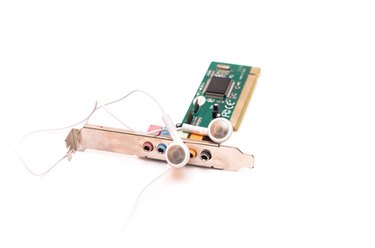
In a computer, the sound card is the device that produces all of the audio that you hear, from the MP3 files that you listen to, to the sound that plays when the computer starts. Computer sound cards first began to enter the mainstream in the late 1980s and early 1990s. Today, no computer is without one. There are three primary types of sound cards, and each type has its own benefits.
Motherboard Sound Chips
Video of the Day
When sound cards were first introduced, they were expensive add-on cards that cost hundreds of dollars. As computer sound technology began to come down in price, miniaturization technology enabled computer hardware manufacturers to condense all of the technology required to produce sound into a single chip. Today, it is rare to find a computer that does not have a motherboard sound chip, even if a separate sound card is installed. Motherboard sound chips helped sound cards to become affordable for all computer owners. If your computer has audio jacks on the motherboard backplane with the other expansion ports such as the USB ports, your computer has a motherboard sound chip.
Video of the Day
Standard Sound Cards
A standard sound card is an expansion card that connects to one of the slots inside the computer. One of the benefits of using a sound card rather than a motherboard sound chip is the fact that sound cards have their own processor chips, while a motherboard sound chip relies on the computer processor to perform some of the calculations required to produce sound. A standard sound card creates less of a load on the main processor, which can result in improved performance when playing games. Additionally, some standard sound cards have features that motherboard sound chips do not, such as 24-bit recording or multiple channel surround sound.
External Sound Adapters
An external sound adapter is a small box that contains all of the features of a standard sound card, but connects to the computer via a USB or FireWire port rather than an internal expansion slot. External sound adapters sometimes have features that standard sound cards do not, such as extra inputs and outputs and physical volume control knobs. An external sound adapter is much easier to move to a new computer than a standard sound card, and is the only way to upgrade the sound of a laptop with nothing but USB or FireWire expansion slots.